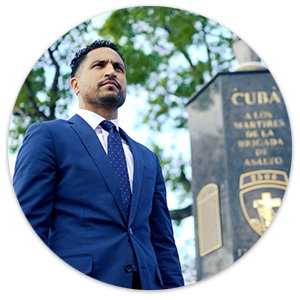Miami Excessive Force Lawyer
Serving Miami and the surrounding counties.
![]()
“Richard is deeply invested in his community and is a professional of purpose and integrity. As our legal counsel, his strategic approach, proactive communication, and commitment to our organization’s needs and goals have helped us navigate challenges as well as build important partnerships.”
Dejha C.
![]()
“I have used Richard’s services multiple times over the past 4 years and he continues to exceed expectations. His attention to detail and excellent communication deliver the quality and peace of mind I look for when hiring legal counsel. If you’re looking for someone that is honest and will deliver on his word, Richard if the person you’re looking for.”
DJ O.
![]()
“I go to Richard Guzman because of trust. He was recommended by my dear sister that had the pleasure of working with Mr. Guzman. By having a direct recommendation, I did not doubt that he could ease my worries and that I would be backed by a knowledgeable, trustworthy professional.”
Piero S.

Download our free personal injury guide.
Learn what you should and shouldn't be doing to help you personal injury case.
Download NowMiami Excessive Force Lawyer
Excessive force is defined as the use of more force than is necessary to accomplish a lawful police purpose.
It can include physical force, such as punching or kicking, or the use of weapons, such as batons, pepper spray, or firearms. Excessive force can cause serious injuries or even death, and it is a violation of a citizen’s civil rights. In Miami, there have been several high-profile cases of excessive force by police officers. In 2019, a video surfaced showing Miami police officers violently arresting a woman at a local gas station. The video shows the officers using a taser and pepper spray on the woman, who was not resisting arrest. The incident sparked outrage and calls for the officers involved to be held accountable. Another incident that sparked outrage in Miami was the death of George Floyd in Minneapolis in May 2020. The incident sparked protests across the country, including Miami. Protesters in Miami called for an end to police brutality and for police officers to be held accountable for their actions. In response to these incidents, the city of Miami has taken steps to address the issue of excessive force. In 2020, the Miami Police Department implemented a new use-of-force policy that emphasizes de-escalation and requires officers to use the least amount of force necessary to accomplish their objectives. The policy also requires officers to intervene if they see another officer using excessive force. However, some critics argue that these policies are not enough and that more needs to be done to hold police officers accountable for their actions. They argue that there is a lack of transparency and accountability in the Miami Police Department, which makes it difficult to hold officers accountable for their actions. One solution to this problem is the implementation of body cameras for all police officers. Body cameras can provide a record of police interactions with civilians, which can be used as evidence in cases of excessive force. Body cameras can also help to improve police behavior by holding officers accountable for their actions. Another solution is to create an independent civilian review board to investigate cases of excessive force. The review board would consist of citizens from the community who would investigate complaints of excessive force and make recommendations for disciplinary action.Excessive force is a serious issue in Miami, and it is important to address it.
The implementation of new use-of-force policies, body cameras, and civilian review boards can help to improve police accountability and reduce incidents of excessive force. It is important for the community to work together with law enforcement to build trust and ensure that everyone is safe and protected. Community involvement is also a key factor in addressing excessive force. It is important for community members to report incidents of excessive force and to hold law enforcement accountable for their actions. Building strong relationships between law enforcement and the community can also help to reduce incidents of excessive force. Training is also important in reducing incidents of excessive force. Law enforcement officers should receive regular training on de-escalation techniques and how to use force appropriately. Training should also include education on implicit bias and cultural sensitivity. The city of Miami has taken steps to address the issue of excessive force, but more needs to be done. It is important to continue the conversation about police accountability and to work towards solutions that promote safety for everyone in the community. By working together, we can create a safer and more just society for all. In addition to the solutions mentioned above, there are also calls for broader systemic changes to address the root causes of excessive force, such as racism and discrimination. It is important to recognize that excessive force disproportionately affects communities of color and low-income communities. Police reform advocates are calling for the reallocation of funding from law enforcement to social services that can address the underlying social issues that lead to crime and the over-policing of marginalized communities. These services can include affordable housing, mental health care, substance abuse treatment, and education. It is also important to address the culture of law enforcement that sometimes tolerates or even encourages the use of excessive force. This culture can be reinforced by a lack of accountability for officers who engage in misconduct and a lack of transparency in the disciplinary process. It is important to create a culture within law enforcement that prioritizes the protection of human rights and the fair treatment of all people. Excessive force is a complex and multifaceted issue that requires a multifaceted solution. It is important to address the issue through a combination of policy changes, training, community involvement, and systemic reforms. By working together, we can create a society where everyone is treated fairly and justly, and where law enforcement is held accountable for their actions.The statute of limitations for filing excessive force claims in Florida
Excessive force cases are unfortunately not uncommon in today’s world, and they can lead to significant physical, emotional, and financial hardships for victims. Fortunately, the legal system provides a means for individuals who have experienced excessive force at the hands of law enforcement officers to seek justice and compensation for their injuries. However, it is crucial to understand the statute of limitations for filing excessive force claims in Florida, and the requirements that come with it. This article will provide a comprehensive overview of the statute of limitations and the necessary steps for pursuing an excessive force claim in Florida.
Statute of Limitations in Florida
The statute of limitations refers to the time limit within which an individual must file a lawsuit. If you fail to file your claim within this timeframe, you may lose your right to seek compensation for your injuries. In Florida, the statute of limitations for excessive force claims is governed by state law, and it is essential to be aware of the specific deadlines to ensure your case is not dismissed. The statute of limitations for excessive force claims in Florida, generally falls under personal injury law. In most cases, including those involving excessive force, the statute of limitations is four years from the date of the incident. This means that if you have been a victim of excessive force, you have up to four years from the date of the incident to file a lawsuit against the responsible parties, which may include law enforcement officers, agencies, or municipalities. It’s important to note that there can be exceptions to this general timeframe, depending on the circumstances of your case. For instance, if the excessive force incident resulted in a fatality, the statute of limitations may be altered, and the wrongful death statute of limitations may apply. Consulting with an experienced attorney is crucial to understanding how the statute of limitations may apply to your specific situation.Factors Considered in Determining Excessive Force
Several factors are considered when evaluating whether the use of force by law enforcement is excessive in Florida:- Objective Reasonableness
- Immediacy of Threat
- Alternatives to Force
- Subject’s Actions
- Training and Policy Compliance
Biggest Mistakes After an Excessive Force Accident
An excessive force accident involving law enforcement officers can be a traumatizing experience for the victim and their loved ones. In the aftermath of such an incident, it is important to take certain steps to protect your rights and to ensure that justice is served. However, there are also mistakes that can be made that can harm your case. Here are some of the biggest mistakes to avoid after an excessive force accident:- Failing to seek medical attention: Even if you do not think you are seriously injured, it is important to seek medical attention after an excessive force accident. Some injuries may not be immediately apparent, and delaying medical treatment can make it harder to prove that the injuries were caused by the accident.
- Not gathering evidence: It is important to gather as much evidence as possible after an excessive force accident. This includes taking pictures of any injuries, collecting contact information for witnesses, and keeping any physical evidence, such as torn clothing or damaged property.
- Talking to the wrong people: After an excessive force accident, it is important to be careful about who you speak to. Avoid speaking to law enforcement officers or insurance company representatives without first consulting with an attorney.
- Signing documents without understanding them: It is important to read any documents carefully before signing them. This includes medical releases, settlement agreements, and other legal documents. If you are unsure about the meaning of a document, it is important to consult with an attorney before signing.
- Posting on social media: It is important to avoid posting about the incident on social media or discussing it with anyone other than your attorney. Anything you say online or to others can be used against you in court.
- Waiting too long to take legal action: There are strict deadlines for filing a lawsuit after an excessive force accident. Waiting too long to take legal action can result in your case being dismissed.
The Role of Police Training in Excessive Force Accidents
Instances of excessive force by law enforcement officers have sparked widespread concern and controversy in recent years. These incidents have highlighted the urgent need for comprehensive reform within police departments, with a particular focus on training practices. In this blog post, we will delve into the critical role of police training in mitigating excessive force accidents. By exploring the key components of effective training programs, we aim to shed light on the importance of equipping officers with the skills, knowledge, and tools necessary to uphold public safety while respecting the rights and dignity of all individuals.- Understanding Implicit Bias and Cultural Sensitivity:

- De-escalation Techniques and Conflict Resolution:
- Enhanced Training in Use of Force Policies:
- Mental Health Awareness and Crisis Intervention:
- Accountability and Ethical Decision-Making:
Miami Excessive Force FAQs
If you or a loved one have been involved in an excessive force accident in Miami, you may have questions about your rights and the legal process. Here are some frequently asked questions about excessive force accidents in Miami.Learn more about these commonly asked questions
Miami Excessive Force Accident Story
The story below is for educational purposes only. In the bustling city of Miami, life moved at a fast pace, with residents and tourists alike enjoying the vibrant culture and beautiful surroundings. Among the city’s diverse population was a young man named Andre, a hardworking, honest individual who devoted his free time to volunteering in his community. One fateful evening, Andre found himself in the wrong place at the wrong time. While walking home from his late-night shift at a local grocery store, he witnessed an altercation between a group of individuals and a police officer. Concerned for everyone’s safety, Andre attempted to intervene, hoping to diffuse the tense situation. Unfortunately, in the heat of the moment, the police officer mistakenly perceived Andre as a threat. The officer, acting on adrenaline and fear, used excessive force to subdue him. Andre was left with severe injuries, including a broken arm, fractured ribs, and a concussion. Shaken and devastated by the incident, Andre knew he needed help. His friends and family urged him to seek the assistance of Richard Guzman of The Guzman Firm, PLLC, a renowned Miami excessive force lawyer with a reputation for defending victims of police misconduct. Upon hearing Andre’s story, Richard felt a deep sense of injustice and immediately agreed to take his case. He recognized the importance of holding law enforcement accountable for their actions and ensuring that Andre received the compensation and justice he deserved. Richard began his meticulous investigation, collecting evidence, and interviewing witnesses to build a solid case against the officer. His dedication and expertise led him to uncover a pattern of excessive force incidents involving the officer, strengthening Andre’s case even further. When the case went to trial, Richard presented the evidence with clarity and passion, highlighting the officer’s history of misconduct and the devastating impact the incident had on Andre’s life. The jury was moved by Richard’s conviction and Andre’s resilience, and after hours of deliberation, they ruled in Andre’s favor. The verdict awarded Andre significant compensation for his injuries, lost wages, and pain and suffering. The outcome also prompted a thorough review of the police department’s policies and training procedures, ensuring that future incidents of excessive force would be less likely to occur. Thanks to Richard Guzman’s unwavering dedication and expertise, Andre was able to find a sense of closure and justice. He continued to heal, both physically and emotionally, and returned to his community work with renewed vigor, inspired by the tireless efforts of the Miami excessive force lawyer who had championed his cause. As word of Richard’s success spread throughout Miami, his reputation as a skilled and passionate lawyer grew stronger. The people of the city knew they could rely on Richard Guzman and The Guzman Firm, PLLC, to stand up for their rights and seek justice for victims of excessive force and police misconduct.Contact a Miami Excessive Force Lawyer at The Guzman Firm, PLLC today!
At The Guzman Firm, PLLC, we are committed to providing high-quality legal representation to victims of excessive force in Miami. Our experienced Miami excessive force lawyer has a deep understanding of the legal complexities involved in these types of cases and are dedicated to helping our clients seek justice and compensation for their injuries. When you choose to work with us, you can expect: A compassionate and supportive legal team: We understand that dealing with the aftermath of an excessive force incident can be overwhelming and stressful. Our legal team will provide you with the support and guidance you need to navigate the legal process and ensure that your rights are protected. A thorough investigation of your case: We will conduct a comprehensive investigation of your case, gathering evidence such as witness testimony, medical records, and video footage to build a strong case on your behalf. Aggressive representation in court: Our Miami excessive force lawyer is a skilled litigator who will fight tirelessly on your behalf in court to ensure that you receive fair compensation for your injuries and that the responsible parties are held accountable for their actions. A commitment to justice: We are passionate about promoting justice and equality for all members of our community. When you work with us, you can rest assured that we will work tirelessly to ensure that your rights are protected and that justice is served. If you have been the victim of excessive force in Miami, don’t hesitate to contact us at The Guzman Firm, PLLC. We offer a free consultation to discuss your case and help you understand your legal options. Let us help you seek the justice and compensation you deserve.
Client Reviews
![]()
I have only positive words to describe working with him. I will continue trusting our working relationship with a solid base that will support us for the year to come!


